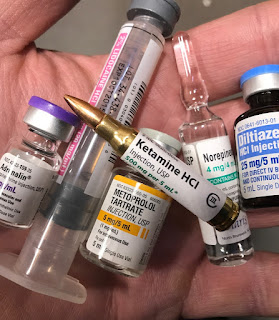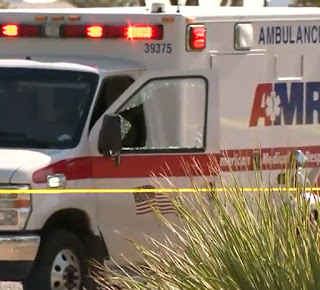Scene Safety - More Than Jazz Hands and Words
While we certainly should not be panicked, and while there is no reason to suspect that EMS personnel will be targeted for violence, it is worth noting that we have seen periodic episodes of discord across the country over the last year or so. High profile events occur and fuel these episodes, usually resulting in violence against law enforcement. The most recent event was the shooting of Dallas Police Officers last night. But EMS is not immune from violence. We are uniformed and often on-scene when people are angry, under the influence, or just plain ornery. People can and do hurt us, too. If you are not already practicing scene safety on every call you are on you really should start.
Here's a quick training-guy guideline: Remember "R.A.V.E."
R = Respect. Showing simple respect to individuals on-scene can de-escalate many situations. "Sir, Ma'am, Thank You, Please, I'm Sorry..." These all go a long way in keeping people calm.
A = Awareness. We sometimes view our job as routine. We arrive, enter a home, fixate on the patient, do our assessment, and then transport. I myself have been guilty of missing dangers and possible threats on scene. What's important is that we and our partners practice strong scene awareness. Note what people are doing, saying, and how they are saying it. Watch for objects or situations that may be dangerous for responders on scene. Make a note of areas that could be used for ambush. If your gut instinct is that something is not right, heed that feeling and work on leaving the scene and/or summoning law enforcement.
V = Validate. We deal with annoyed patients, family, and even partners on a fairly regular basis. One way to talk people down is to validate what they are saying. "I'm sure you're very angry about this, sir. I would be angry too - however we should still get you some help." or "I understand how this could be upsetting - what can we do to make this easier for you?" Again, the sincere use of apologies very often makes individuals drop their guard. Most people just want to feel they are being heard.
E = Egress. Basically, always have a way out of a scene. If the proverbial poop hits the fan you should be able to quickly exit a scene. Know where your exits are and know if they are clear. You can even establish a code-word with your partner for when things are beginning to get dicey: "Sir, we need to quickly grab another piece of equipment to check your heart. Jim, can you help me get the "yellow bag" really quick?"
Keep in mind that we don't expect to be assaulted, attacked, or injured by patients and bystanders, but we still have a responsibility to ourselves to ensure that we're safe on every call. Scene safety is NOT simply waving your hands in the air and saying "BSI - Scene is safe". It needs to be practiced with concerted efforts.
Be safe out there!
Here's a quick training-guy guideline: Remember "R.A.V.E."
R = Respect. Showing simple respect to individuals on-scene can de-escalate many situations. "Sir, Ma'am, Thank You, Please, I'm Sorry..." These all go a long way in keeping people calm.
A = Awareness. We sometimes view our job as routine. We arrive, enter a home, fixate on the patient, do our assessment, and then transport. I myself have been guilty of missing dangers and possible threats on scene. What's important is that we and our partners practice strong scene awareness. Note what people are doing, saying, and how they are saying it. Watch for objects or situations that may be dangerous for responders on scene. Make a note of areas that could be used for ambush. If your gut instinct is that something is not right, heed that feeling and work on leaving the scene and/or summoning law enforcement.
V = Validate. We deal with annoyed patients, family, and even partners on a fairly regular basis. One way to talk people down is to validate what they are saying. "I'm sure you're very angry about this, sir. I would be angry too - however we should still get you some help." or "I understand how this could be upsetting - what can we do to make this easier for you?" Again, the sincere use of apologies very often makes individuals drop their guard. Most people just want to feel they are being heard.
E = Egress. Basically, always have a way out of a scene. If the proverbial poop hits the fan you should be able to quickly exit a scene. Know where your exits are and know if they are clear. You can even establish a code-word with your partner for when things are beginning to get dicey: "Sir, we need to quickly grab another piece of equipment to check your heart. Jim, can you help me get the "yellow bag" really quick?"
Keep in mind that we don't expect to be assaulted, attacked, or injured by patients and bystanders, but we still have a responsibility to ourselves to ensure that we're safe on every call. Scene safety is NOT simply waving your hands in the air and saying "BSI - Scene is safe". It needs to be practiced with concerted efforts.
Be safe out there!


Comments
Post a Comment